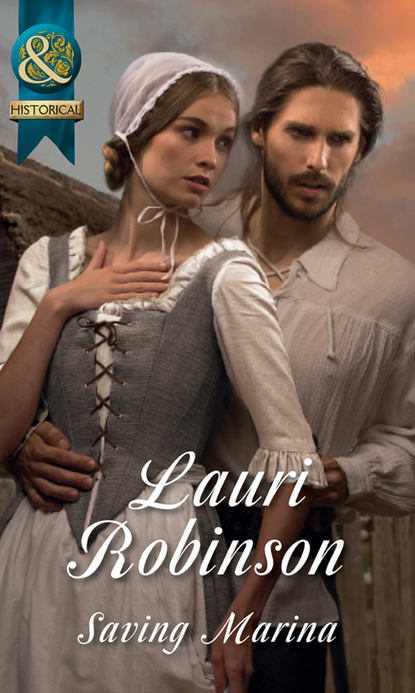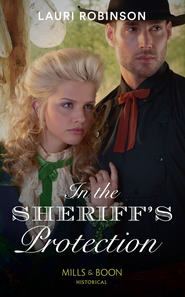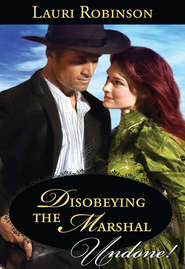По всем вопросам обращайтесь на: info@litportal.ru
(©) 2003-2025.
✖
Saving Marina
Настройки чтения
Размер шрифта
Высота строк
Поля
“Of course I will.”
“What about Gracie?” she persisted. Her heart had almost broken upon finding the little girl so ill and dirty. From that moment on, determination filled her to see Gracie healthy, safe and well. Perhaps because it was her only chance to do so. It was a known fact witches—real witches—couldn’t conceive children. “She needs a family,” Marina stated with all the fortitude filling her. “A father, not just a provider.”
* * *
For a woman who’d stared at the floor, not mumbling a word, Miss Marina Lindqvist certainly wasn’t afraid to let her contempt be known when the moment arose. Richard, on the other hand, was skilled at keeping things inside, where no one but that sleeping giant judged him. Unwilling to explain his plan for his daughter, he asked, “How did Grace come to be here? With you?” Although dressed like one, this woman was not a Puritan, nor was she married, as he’d assumed from her note stating his daughter could be found at “our” house. However, knowing those two things only increased the number of questions rolling around in his head.
William was the one who responded while his niece remained silent. “Because of Marina, your daughter is alive, Richard. Despite those intolerant fools.”
Anger set Richard’s jaw tight. The tiny child upstairs had been neglected. Neglected until she was little more than skin and bones. He may have visited his wife and family only once, but he’d sent money regularly and other things. Goods and materials, furniture, seeds. Anytime he’d heard someone mention an item the colonials needed, he’d sent a good supply to Salem Village in Sarah’s name. When he discovered who’d withheld food from his daughter, he’d throttle them with his bare hands. “What intolerant fools?”
“Practically everyone in the village,” William said. “That new preacher has blinded the lot of them. The poor fools were so hungry for a leader they don’t recognize they’ve been duped.”
Richard didn’t miss the emphasis the man used. Sea captains weren’t known for their religious affiliations. He’d never known one who’d held regular church services upon their ship—other than him. He’d captained the passenger ship that had carried Sarah and her family to America. It had taken less than two months to sail from shore to shore, and during that time he’d wedded Sarah, who was pregnant with Grace before he lowered the sails for the final time. He couldn’t say he’d been coerced into marriage—that had been Earl’s explanation when he’d told the man what had happened. A part of him may have fallen in love with Sarah, longed for a communion with her, or at least the young, supple body she’d so readily offered. He hadn’t told Earl that but had mentioned he wasn’t the only one to become wedded on that trip. A total of six mates had joined him at the makeshift altar aboard his ship. All but two had been at his side when he’d set sail for England a week after landing in Boston. Earl had chided the lot of them. Claimed that was what the new order of Puritans did—sought out strong, healthy males to impregnate their women in order to gain new bloodlines in their communities. In his berating, Earl had described them as nothing but studs needed for service. Richard had been demoted to first mate for the next six months. The punishment may have lasted longer if a fierce winter storm hadn’t set pneumonia into Earl’s lungs. Unable to captain the ship, the illness getting the best of him, Earl had called Richard to the helm.
“That man is as corrupt as his papa was,” William was saying. “He made a mess of things in Barbados and again in Boston. Guess preaching was the only thing he hadn’t tried.”
Richard hadn’t heard who William was talking about. If the other man had said a name, it had been while he’d been recalling other things. Setting his mind on listening, Richard asked, “What’s he doing?”
“Filling their heads with lies and misinterpretations,” William said. “Ideas have changed since the first Puritans came to America. The original founders have died off and the next generation isn’t satisfied with their lots. They seek power and wealth, just like the rest of the world. Some have become merchants and businessmen, and those set in the old ways have grown resentful of any who won’t give the church all of their income or spend hours worshipping each day.”
If for no other reason than the things William was saying aligned with Richard’s own beliefs, he nodded. Changes were happening all around the world, and those not willing to accept that would never flourish. He’d used that fact, how sailing was his means to provide for his family, as an argument when Sarah’s father had insisted he needed to choose between the sea and his life as a married man. The two, his father-in-law had insisted, could not be one. Blasphemy. This very country had been settled by those escaping religious persecution and he hadn’t been about to become a victim of such unjust piety. Nor had he been willing to become a farmer.
“Salem Village was once the farming parish of Salem Towne,” William said, “but when those in Salem Towne began to prosper, the poorer farmers in the village grew resentful. They petitioned separation and the right to form their own community. They wanted their own church, too, and to hire their own minister, not one chosen by the Salem business owners. I figured things would settle down once that happened. It didn’t.”
“The new preacher you spoke of...” Richard said. His attention was spiked by the way Marina had started to fidget in her chair. She didn’t seem bored with the tale her uncle was unraveling. In fact, the way she wrung her hands together told him she was nervous about something her uncle might say. That was what Richard wanted to hear. Instincts said it included his daughter. Whoever had almost let his daughter starve would pay dearly.
“Yes,” William said. “I can’t say why they hired him. Samuel didn’t know. Samuel Godfrey, that is. He owns a store in town and only ventures out this way occasionally to deliver the things Marina orders from him. She and I don’t get out much.”
That too spiked Richard’s interest. William was old. Traveling even the short distance to town would be exhausting, but Marina was young. He saw no reason she couldn’t venture to town. “Why don’t the two of you get out much?”
William lifted both bushy brows. “Because we don’t want to lose everything, including our lives.”
Marina’s swallow was visible, as was the way she shook her head, trying to stop her uncle.
Richard quickly asked, “How would that happen?”
“They’d stretch our necks,” William said flatly.
The tree he’d seen earlier flashed before his eyes. “What for?”
“For being witches,” William said.
Chapter Three (#ulink_ebe0007c-0cd5-5720-9572-0486f795786d)
Marina’s stomach fell and she closed her eyes. That was Uncle William, going on and on about differences that truly didn’t concern them and then bluntly cutting to the quick of the story. He didn’t believe she was a witch, despite the proof she offered. Holding her breath, she maintained her silence. For as unorthodox as her uncle’s home may be, there were still boundaries. He was the man of the household and she had to respect that, but if he started to share her story, she’d interrupt. There was no telling what the captain might do if he learned she was a witch.
When the two men refrained from speaking, and their gazes settled upon her, she stood. “Excuse me.” Perhaps if she reminded them as to why Richard was here, her uncle would get to the true heart of the matter. “I must see to the soup and check on Gracie. The sooner she gets well, the sooner she can travel to Boston.”
Marina left the room without a backward glance. Perhaps now Uncle William would tell the captain to return to Boston until Gracie was able to travel. That amount of time—until the child was well—had been granted, but she wouldn’t put it past Hickman to pay a visit to the house. He’d claim it was on behalf of the church, but she knew better.
After ladling broth into a bowl, Marina went out the back door to collect water from the well. The huge horse Richard had ridden stood next to the water trough she filled daily for the chickens. Back home, tending to the animals had been her chore, one her father prided her on, and seeing a creature uncomfortable didn’t settle well.
Nellie, their single cow in the paddock, bellowed a low welcome as Marina led the horse into the shade of the barn and reminded her she’d need to find a home for the cow, too. She also pondered removing the saddle from the horse’s back but, considering Richard would soon leave, chose against it. Her dream last night had shown Gracie healthy and was the most enjoyable one she’d had in months. Tending to the child the past few days had been extremely pleasurable. Something she’d always treasure.
Marina stopped that thought from going further—to babies that could never be—by focusing on settling the animal. The horse was frightfully large but gentle, and she patted its long neck and side while walking out of the stall wall. As she dropped the board in place to keep the animal stabled, a shadow cast upon the barn floor.
“So, you’re a witch.”
For the first time in ages, Marina wanted to smile. The image of this man, who was indeed as beastly in size as his horse, fleeing when she said yes was the cause. She’d seen that happen in Maine, grown men flee at the thought of encountering a witch.
The bright sun cast a haze of light around the frame standing in the doorway, from the toes of his knee-high boots to the top of his midnight-colored hair hanging past his shoulder. It made a remarkable sight, for his size and stature made him a formidable being. That told her something else. This man wouldn’t flee from a witch. Real or imaginable. He’d stand his ground.
Needing to know if that was true, she asked, “Do you believe in witches, Captain Tarr?”
“I’ve given you permission to call me Richard,” he said, bracing one hand against the door frame. “I’m only a captain while at sea.”
She gave a single nod, just to prove she’d heard him. “Do you believe in witches, Richard?”
He stood silent, making her wonder if he would answer or not. The breeze made the sleeves of his white shirt billow slightly, and for a moment she didn’t want to know his answer. The strength of the arms beneath that shirt had to be as solid as the rest of him. If he believed as the other villagers did, and chose to use his strength to capture her, she’d end up in Salem’s jail before assuring Grace and Uncle William’s escape.
“Witches,” he said, “are akin to angels. In some religions, that is. Some claim you can’t believe in one and not the other.”
Such a compromising answer was not what she’d expected. Discussing religious beliefs other than Puritan ones was illegal in the village and highly punishable. She considered telling him as much, but that in itself was punishable, as well. A man married to a Puritan woman would know such things and would not tempt punishment. As much as she’d relish the opportunity to debate her beliefs, to defend the holistic religion she’d participated in from birth, it would be a waste of breath. She doubted this man had ever read the Bible. She’d read it daily for as long as she could remember and sincerely missed having others to help her comprehend the parables. Uncle William was very little help with that. He did not see the connection between the Indians destroying her family and what was happening in the village.
She did.
She was a witch. There was no denying it. And no changing it. There was no comparing it to an angel, either. The two were as different as day and night. Alive and dead. Pure and evil.
Swallowing the bitterness that coated her tongue, for there were still things she had to accept, she nodded. “I didn’t unsaddle your animal. My hope is that Gracie will be able to travel by the end of the week.”
He stepped forward. “I’ll unsaddle him.”
Sidestepping in order to keep a fair amount of distance between them because his nearness made her insides tremble, she said, “I didn’t unsaddle him, so you could return to Boston. There is no need for you to remain here. You must realize Gracie can’t travel right now.”
He looked at her pointedly. “I do, but I’m not leaving. Not without Gracie. When she’s well enough, we’ll travel to Boston.”
Marina’s heart leaped into her throat. “But you can’t stay here.”
“Why?”
“Because...” She closed her eyes as dread filled her soul. “It’s too dangerous.” Drawing strength from within, she lifted her lids. “Far too dangerous. Please, you must leave.”
“Not without my daughter.”
“It’s for her sake that you must leave.”
He shook his head. “It’s for her sake that I must stay.”











